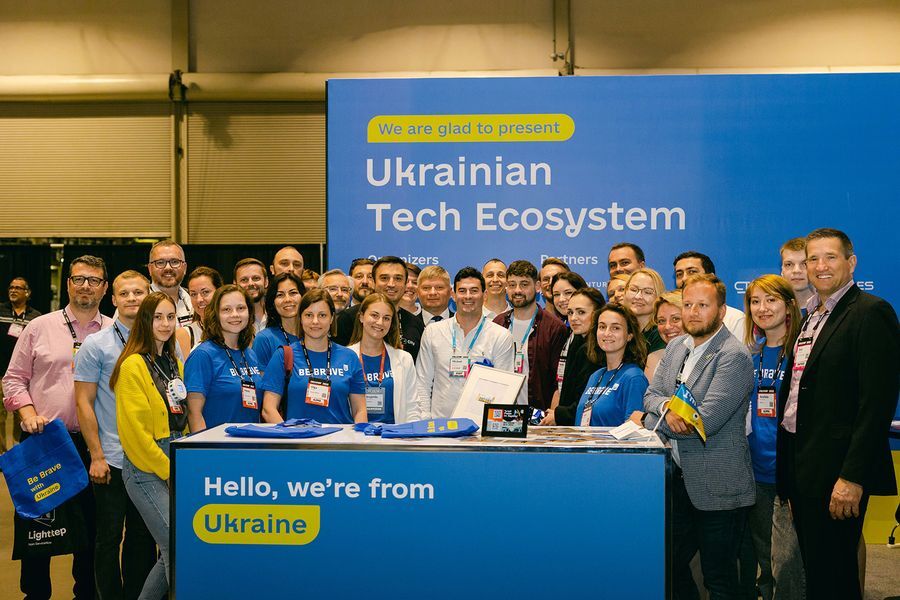
The stories emanating from war-torn Ukraine are now legendary, and 4,700 miles away, eight Ukrainian startups, all selected by the Ukrainian Technology Ecosystem, displayed their concepts and innovations — as well as the nation’s resilience — at the Ukrainian Partner Startup Pavilion at the Collision Conference in downtown Toronto.
Delegation Chairperson Ievgenlia Bespalova said 300 companies applied for the chance, and eight were picked “to demonstrate the nature of Ukrainian technology.” Organized by a coalition of Ukrainian groups, the delegation helped to arrange travel; secure the exhibit space; and assist with pitches, case studies and presentations to investors. “Obviously, with a war going on, the Ukrainian government can’t give money to our startup community — not when we need to purchase weapons for defense — and that’s where our organization steps in to provide support and funding,” Bespalova said.
The path to Canada was no simple feat. “There are many places in Ukraine where companies are working with laptops in the dark, even as bombs are falling nearby,” Bespalova said. “But we accept this challenge and keep on working.”
Olga Sushchenko, director of business development for Effa, producers of the world’s first recyclable and renewable toothbrush made from paper, said her company is “still pretty much able to function as though it’s business as usual.” She acknowledged, however, that they’re having production delays and difficulty getting domestic investments. “So that’s a major reason why we’re here.”
Despite the problems at home, she said, “We have a mission to combat global pollution with disposable plastic, and to us, it’s a great product that we want to share with the world. At the moment, we’re still surviving and we’re still alive, so this is right where we want to be.”
Irina Andriushchenko is the CEO of Handy.ai, an entity that allows companies to automate and improve interaction with people in real time, deploying a language to which each individual can relate through styles and channels of communication that are most convenient to the end user. “Collision is such a great place to be for us, especially considering the situation in our country right now,” she said. “For us, being here reminds us that we are really a part of global startup community. You cannot possibly imagine what it means for us because it allows us to feel that we are a part of this worldwide growth.
She said the company has gotten feedback from people, including the deputy mayor of Toronto, “who tells us that we have a product that’s really interesting. Our platform is designed to help workers, and employers but also homeless people, immigrants and others effectively communicate without desks, without computers, in a language that works for them.”
In addition to Effa and Handy.ai, other companies exhibiting in the Ukrainian startup alley include:
- ImageryWard — a digital image copyright platform based on blockchain and artificial intelligence.
- NanitRobot — an educational robot for children that can replace 100 toys and 50 kilograms of plastic. It was developed on Scratch and C.
- zeely.app — a mobile application for business promotion with convenient marketing tools for non-marketers.
- Elai.io — a text-to-video conversion platform that allows companies to generate educational and marketing video content with human speakers from a single text.
- Jiffsy Platform — a TikTok-style showcase for online clothing stores built specifically for mobile devices, which doubles sales from mobile phones.
- Harmix — an intelligent service that automatically selects music to video.
“With 3,000 startups in our country, it’s really important that we are here because we have a really strong emerging market,” Bespalova said. “It’s an ecosystem that was growing very quickly and very impressively before the war. Now, we have to keep it going so we can continue that growth once the war is over.
“In the meantime, we’re here (in Toronto) to help understand how Ukraine can he useful to the world.”
How’s that for resilience?
Steve Winter and Kenny Fried are WTOP contributors who work for Brotman|Winter|Fried, a division of Sage Communications.







